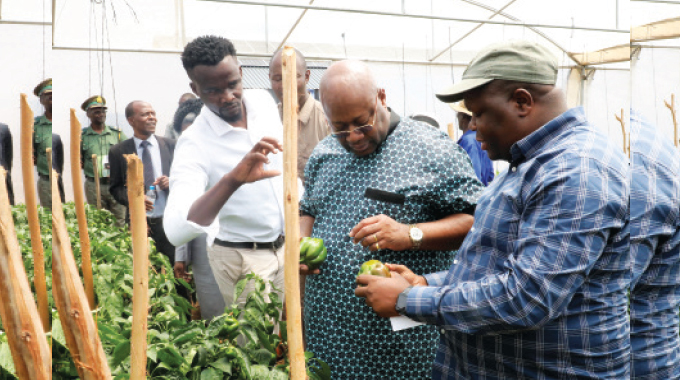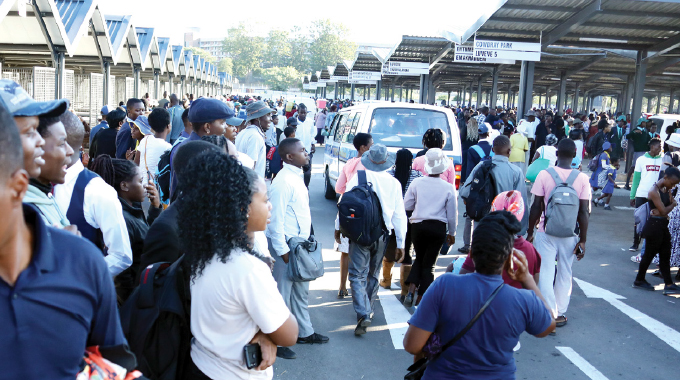Horticulture project busting gender based violence

Nqobile Tshili, [email protected]
A HORTICULTURE garden project in Nhlambabaloyi village in Umguza district, Matabeleland North is busting gender-based violence (GBV) as vulnerable and financially insecure community members have become economically viable while getting social support.
Established last year, the Thuthukani Luthi B Horticulture project is part of the gender-inclusive local economic development programme being implemented by the Government in collaboration with Gender Links.
Gender Links is the development partner working with Umguza Rural District Council, to transform the lives of community members.
A total of 50 vulnerable community members were identified to be part of the project, which is already transforming lives.
Thuthukani Luthi B, as its name suggests, is changing the lives of the beneficiaries who are running a successful greenhouse farming venture producing cash crops including yellow pepper and red pepper, as well as tomatoes.
They are supplying markets in the hospitality industry with some of their produce reaching as far as Victoria Falls.
Thuthukani Luthi B Horticulture Garden Project chairperson Mr Nkululeko Mhlanga, said the project which covers mainly vulnerable women, the youth and men has even mitigated GBV cases.
“This project has uplifted us as the Ntabazinduna community. We now have markets where we sell our products and one of our objectives is to tackle gender-based violence,” said Mr Mhlanga.
“We have some of our members who were victims of gender-based violence, but working together has seen some of our members opening up on GBV. The victims of GBV are now financially empowered, and they are no longer dependents.”
Mr Mhlanga said each of the 50 members gets a minimum of US$70 depending on the market price of their products.
“We are producing yellow pepper and red pepper and already we have clients who are buying our products. Some of the clients take our products to Bulawayo while others take them to hotels in Victoria Falls,” he said.
“So we are turning one year this month and at the moment an individual gets about US$70 a month depending on the market situation.”
A beneficiary and GBV victim, Mrs Racheal Dumile from Luthi B village said it was even more difficult for her to open up on abuse as she was a community health worker whose duties included educating other women on GBV.
“Before I joined this project it was even difficult for me to leave my homestead. I felt as if I was imprisoned and I didn’t have self-confidence, but the arrival of the horticulture programme through Gender Links has changed our lives,” she said.
“I was silently suffering and we didn’t realise how damaged we were. I was afraid to open up that I’m a victim of GBV because I am also a community leader. I am a community health worker who is expected to teach others.”
Mrs Dumile said being part of the group has liberated, not just her, but other women who have found refuge by being part of the group.
She said she is now able to confront her demons while also normalising relations at home.
Gender Links regional director Mrs Priscilla Maposa said there is a link between poverty and GBV with women bearing the brunt of the scourge.
“Women continue to be in abusive relationships because they lack economic means. So through this programme, we are trying to empower them so that they can be able to have economic means,” she said.
Mrs Maposa said her organisation is working with 12 local authorities countrywide to promote gender inclusivity in local development with Umguza RDC and Bulawayo being part of the beneficiaries.
She said her organisation conducts monitoring and evaluation of the projects to establish their success rate.
“In terms of the beneficiaries, 50 percent of the beneficiaries are women, followed by 30 percent youths and 20 percent men. We have more women and youths because these have been lagging behind when it comes to economic development,” said Mrs Maposa.
“This is why we decided to ensure that we have more women and youths. Some of the key results of the programme are that when we started the programme we measured the income levels of the beneficiaries. However, as we proceed with the programme, we notice that income levels have increased for some of the beneficiaries.”
Mrs Maposa said through empowerment initiatives, the country is not just addressing GBV, but also fulfilling the UN Sustainable Development Goals.
“This programme also targets to ensure that the trained beneficiaries become employers, creating jobs and contributing towards Vision 2030 as well as contribute towards sustainable livelihoods in their homes,” she said.
Local Government and Public Works Minister Winston Chitando said they will make sure that the project is replicated across the country.
“The projects are aimed at uplifting the vulnerable communities of which there is a major focus on women, youth and also men who need to be empowered. The projects are empowering communities, these projects are generating income for the pocket,” he said. —@nqotshili









Comments